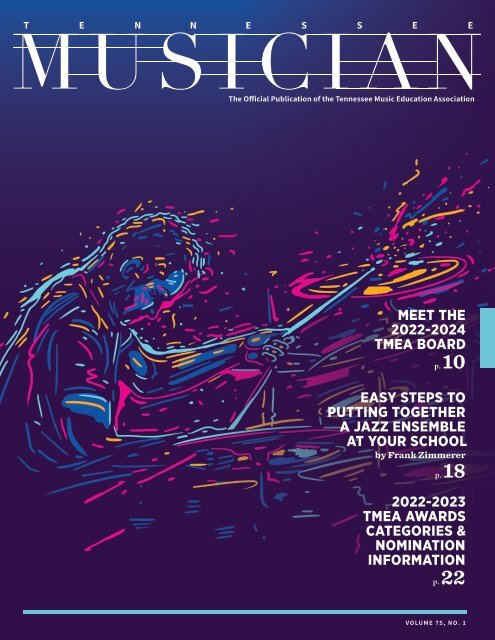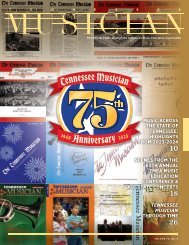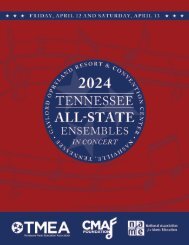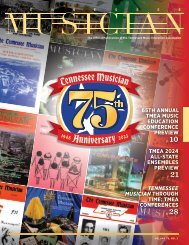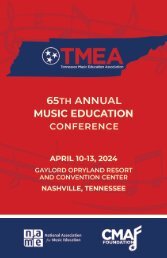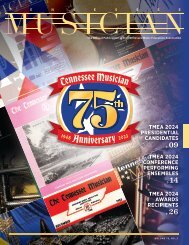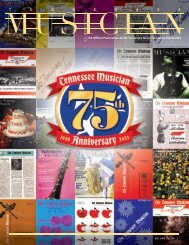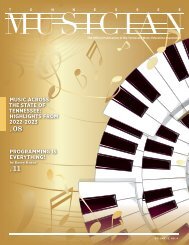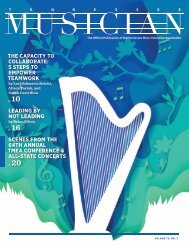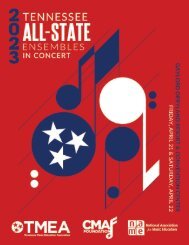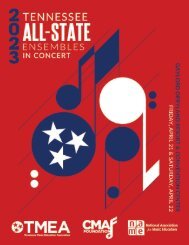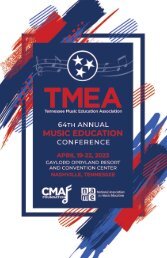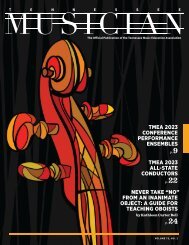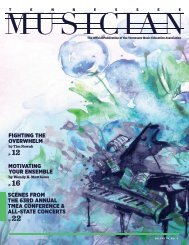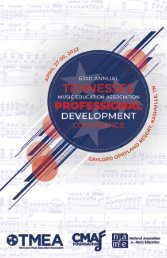TN Musician, Vol. 75, No. 1
You also want an ePaper? Increase the reach of your titles
YUMPU automatically turns print PDFs into web optimized ePapers that Google loves.
The Official Publication of the Tennessee Music Education Association<br />
MEET THE<br />
2022-2024<br />
TMEA BOARD<br />
p. 10<br />
EASY STEPS TO<br />
PUTTING TOGETHER<br />
A JAZZ ENSEMBLE<br />
AT YOUR SCHOOL<br />
by Frank Zimmerer<br />
p. 18<br />
2022-2023<br />
TMEA AWARDS<br />
CATEGORIES &<br />
NOMINATION<br />
INFORMATION<br />
p. 22<br />
VOLUME <strong>75</strong>, NO. 1
School of<br />
Music<br />
SCHOLARSHIP AUDITION DATES<br />
Friday, February 3, 2023<br />
Friday, February 17, 2023<br />
Friday, March 3, 2023<br />
tntech.edu/music<br />
(931) 372-3161<br />
music@tntech.edu<br />
1150 N. Dixie Ave.<br />
Campus Box 5045<br />
Cookeville, <strong>TN</strong> 38505-0001<br />
CFA006-PRNT-23
MARCH IS<br />
Learn more at nafme.org/MIOSM<br />
#MIOSM | #MusicIsAllOfUs
TABLE OF CONTENTS 2022 VOLUME <strong>75</strong>, <strong>No</strong>. 1<br />
04<br />
PROGRAM NOTES<br />
TMEA Board and Council Directory<br />
2022-2023<br />
05<br />
07<br />
09<br />
Tennessee <strong>Musician</strong> Advertiser Index<br />
Issue <strong>No</strong>. 1<br />
Prelude - A Message from the Editor<br />
Anna Laura Williams<br />
TMEA President’s Message<br />
Ryan Fisher<br />
10<br />
18<br />
TEACHING IN TENNESSEE<br />
Meet the 2022-2024 TMEA Board<br />
Executive Board and Board of Directors<br />
Easy Steps to Putting Together a<br />
Jazz Ensemble at Your School<br />
by Frank Zimmerer<br />
TMEA Back Then<br />
27<br />
December 1976<br />
22<br />
Tennessee <strong>Musician</strong> is mailed to members four times each year at an annual<br />
subscription rate of $5.00 (included in dues).<br />
<strong>No</strong>n-member subscription rate (includes S&H): $30.00 per school year;<br />
single copies: $10.00 per issue.<br />
64TH ANNUAL TMEA CONFERENCE<br />
2022-2023 TMEA Awards<br />
Categories & <strong>No</strong>mination Information<br />
MEET THE 2022-2024<br />
TMEA<br />
B ARD<br />
2022-2023<br />
TMEA AWARDS<br />
Categories & <strong>No</strong>mination<br />
Information<br />
Postmaster - Send address changes to:<br />
Tennessee <strong>Musician</strong><br />
c/o Tennessee Music Education Association<br />
2441-Q Old Fort Pkwy, #635<br />
Murfreesboro, <strong>TN</strong> 37128-4162<br />
Published by Slate Group: 6024 45th Street, Lubbock, Texas 79407.<br />
Graphic Design: Nikki Davis. Account Executive: Ian Spector (800-794-5594).<br />
<strong>No</strong>n-Profit 501(c)(3) Organization. U.S. Postage Paid at Lubbock, Texas.<br />
ISSN Number 0400-3332; EIN number 20-3325550.<br />
Copyright © 2022 Tennessee Music Education Association. Reproduction in any form<br />
is illegal without the express permission of the editor: Anna Laura Williams, Managing<br />
Editor & Advertising Manager; anna.laura.williams@tnmea.org.<br />
Tennessee Music Education Association | www.tnmea.org | 3
TMEA BOARD AND COUNCIL<br />
tmea executive board<br />
TMEA Executive Director<br />
Michael W. Chester<br />
michael.chester@tnmea.org<br />
TMEA President<br />
Ryan Fisher, Ph.D.<br />
ryan.fisher@tnmea.org<br />
TMEA President-Elect<br />
Joel Denton<br />
leaderslead@yahoo.com<br />
TMEA Immediate Past-President<br />
Alexis Yatuzis-Derryberry<br />
derryberrya@rcschools.net<br />
TMEA Secretary<br />
Dian Eddleman<br />
deddleman@usjbruins.org<br />
tmea council<br />
WTGMEA President<br />
Jennifer Proseus<br />
wtgmeamemphis@yahoo.com<br />
WTGMEA President-Elect<br />
Allen Moody<br />
amoodyteacher@gmail.com<br />
WTVMEA President<br />
Adrian Maclin<br />
maclinal@scsk12.org<br />
WTVMEA President-Elect<br />
Reachel Hudgins<br />
reachelhudgins@dcchoctaws.net<br />
WTSBOA President<br />
Jennifer Cupples<br />
jennifer.cupples@wcsk12tn.net<br />
WTSBOA President-Elect<br />
Benjamin Martin<br />
bmartin@huntingdonschools.net<br />
tmea board of directors<br />
TMEA State General Music Chair<br />
Ben Torres<br />
benjamin.torres@cmcss.net<br />
TMEA State Choral Chair<br />
Demetrius Robinson, Ed.S.<br />
drobinson@tscsmemphis.org<br />
TMEA State Orchestra Chair<br />
Cynthia Wright<br />
cynthia.wright@maryville-schools.org<br />
TMEA State Band Chair<br />
Ollie Liddell, Ph.D.<br />
liddello@scsk12.org<br />
TMEA State Higher Education Chair<br />
Lauren Ramey, Ph.D.<br />
lauren.e.ramey@gmail.com<br />
MTGMEA President<br />
Corynn York<br />
yorkc@rcschools.net<br />
MTGMEA President-Elect<br />
Abbi Miller<br />
abigail.miller@cityschools.net<br />
MTVA President<br />
Lorna Pyka<br />
lornapyka@yahoo.com<br />
MTVA President-Elect<br />
T.J. McLaughlin<br />
t.j.mclaughlin@sumnerschools.org<br />
MTSBOA President<br />
J.R. Baker<br />
john.baker@rcstn.net<br />
MTSBOA President-Elect<br />
Stacy Jernigan<br />
stacy.jernigan000@gmail.com<br />
TMEA NAfME Collegiate Chair<br />
Michael Chandler, Ph.D.<br />
chandlermd@apsu.edu<br />
TMEA Society for Music Teacher<br />
Education/Research Chair<br />
Loneka Wilkinson Battiste, Ph.D.<br />
lbattis2@utk.edu<br />
TMEA Advocacy and<br />
Government Relations Chair<br />
Christopher Dye, Ed.D.<br />
christopher.dye@mtsu.edu<br />
TMEA Communications Manager,<br />
Publications Editor and<br />
Advertising Manager<br />
Anna Laura Williams<br />
anna.laura.williams@tnmea.org<br />
ETGMEA President<br />
Bryant Adler<br />
etgmea@gmail.com<br />
ETGMEA President-Elect<br />
Hannah Strong<br />
hannahstrong@hvocals.com<br />
ETVA President<br />
Kristen Wiram<br />
KristenWi@gmail.com<br />
ETVA President-Elect<br />
William Brimer<br />
william.brimer@knoxschools.org<br />
ETSBOA President<br />
Jim Burton<br />
president@etsboa.org<br />
ETSBOA President-Elect<br />
Megan Christian<br />
presidentelect@etsboa.org<br />
tmea project chairs<br />
TMEA Modern Band Education Chair<br />
Michael Parsons<br />
mlparsons@briarcrest.com<br />
TMEA Jazz Education Policy Chair<br />
Frank Zimmerer, Ed.S.<br />
frank.zimmerer@mnps.org<br />
TMEA Tri-M Chair<br />
Pamela Wilensky<br />
wilenskypb@scsk12.org<br />
TMEA Music In Our Schools Month Chair<br />
Lisa Crunk<br />
crunkl@bedfordk12tn.net<br />
TMEA Music Merchants Industry Chair<br />
Scott Lane<br />
scott@lanemusic.com<br />
TMEA Retired Teachers Chair<br />
Deborah Gouge<br />
debbie.gouge@ecschools.net<br />
TMEA Webmaster<br />
John Womack<br />
john.womack@tnmea.org<br />
tmea all-state & conference management team<br />
<strong>TN</strong> All-State Choral Chair<br />
Brian Russell, DMA<br />
brian.russell@tnmea.org<br />
<strong>TN</strong> All-State Instrumental Chair<br />
Carter <strong>No</strong>blin<br />
carter.noblin@tnmea.org<br />
<strong>TN</strong> All-State Jazz Band Chair<br />
Cord Martin<br />
corderyl.martin@gmail.com<br />
<strong>TN</strong> Treble Honor Choir Chair<br />
Tiffany Barton<br />
tntreblechoir@gmail.com<br />
TMEA Conference<br />
Registration Chair<br />
Mark Garey<br />
mgarey86@comcast.net<br />
TMEA Conference Performing<br />
Ensembles Instrumental Chair<br />
John Mears<br />
mearsj@rcschools.net<br />
TMEA Conference Performing<br />
Ensembles Choral Chair<br />
Susan Kelly, DMA<br />
kellysu@rcschools.net<br />
4 | TENNESSEE MUSICIAN | 2022 | <strong>Vol</strong>ume <strong>75</strong>, <strong>No</strong>. 1
TENNESSEE MUSICIAN ADVERTISER INDEX | VOLUME <strong>75</strong>, <strong>No</strong>. 1<br />
Tennessee <strong>Musician</strong><br />
The Official Publication of the<br />
Tennessee Music Education<br />
Association<br />
Inside Front Cover<br />
Tennessee Tech. University<br />
University of Memphis Rudi E. Scheidt School of Music<br />
02 | NAfME Music In Our<br />
Schools Month®<br />
06 | East Tennessee State<br />
University<br />
08 | Maryville College<br />
13 | Middle Tennessee State<br />
University<br />
Center Page<br />
Bethel University Renaissance<br />
Inside Back Cover<br />
University of Tennessee at Chattanooga<br />
Back Cover<br />
Lee University<br />
20 | University of Tennessee<br />
at Martin<br />
21 | University of Tennessee<br />
Knoxville School of Music<br />
26 | University of Tennessee<br />
Knoxville Bands<br />
28 | Slate Group<br />
The Tennessee Music Education<br />
Association (TMEA) was officially<br />
formed in 1945 as a voluntary, nonprofit<br />
organization representing<br />
all phases of music education at all<br />
school levels. The mission of TMEA<br />
is to promote the advancement of<br />
high-quality music education for all.<br />
Active TMEA membership is open to<br />
all persons currently teaching music<br />
and others with a special interest<br />
or involvement in music education.<br />
Collegiate memberships and<br />
retired memberships are available.<br />
Additional membership information<br />
is available on the TMEA website:<br />
www.tnmea.org.<br />
The Tennessee <strong>Musician</strong> was<br />
founded in 1948 with J. Clark Rhodes<br />
appointed by the TMEA Board of<br />
Control as inaugural editor.<br />
Tennessee <strong>Musician</strong> was preceded<br />
by an earlier publication, Tennessee<br />
Music Editors’ Downbeat, which was<br />
discontinued by the TMEA Board of<br />
Control at the spring board meeting,<br />
held in Chattanooga, Tennessee, in<br />
1948.<br />
All advertising and editorial<br />
materials should be sent to<br />
Anna Laura Williams, Managing<br />
Editor and Advertising Manager;<br />
anna.laura.williams@tnmea.org;<br />
615-784-8632.<br />
Advertising information is available<br />
on the TMEA website:<br />
https://www.tnmea.org/advertising.<br />
html. Submit editorial materials by<br />
e-mail in Microsoft Word format.<br />
<strong>No</strong>n-member subscriptions and<br />
single copy orders can be placed via<br />
e-mail to the editor.<br />
Deadlines for advertisement orders<br />
and editorial materials:<br />
Issue <strong>No</strong>. 1 – Deadline: September 15<br />
(in home delivery: December/January);<br />
Issue <strong>No</strong>. 2 – Deadline: <strong>No</strong>vember 15<br />
(in home delivery: January/February);<br />
Issue <strong>No</strong>. 3 – Deadline: February 15<br />
(in home delivery: March/April);<br />
Issue <strong>No</strong>. 4 – Deadline: April 15<br />
(in home delivery: May/June)<br />
The views and opinions expressed in<br />
the articles included in the Tennessee<br />
<strong>Musician</strong> are those of the authors and<br />
do not necessarily reflect the official<br />
policy or position of TMEA, the<br />
members, the staff, or the advertisers.<br />
Tennessee Music Education Association | www.tnmea.org | 5
DEPARTMENT OF MUSIC<br />
Audition Days for<br />
Fall 2023 Enrollment<br />
Thursday, <strong>No</strong>vember 10<br />
Friday, February 10<br />
Thursday, March 9<br />
Saturday, March 11<br />
• Degrees in Performance, Music Education,<br />
Contemporary Music Performance,<br />
Composition, and Music History<br />
• Nationally-recognized classical and<br />
contemporary ensembles<br />
Make Your<br />
Dreams a reality<br />
• Award-winning faculty who care about<br />
student success<br />
• Competitive scholarships up to full tuition<br />
available for music majors<br />
• Scholarships available to all non-music<br />
majors who participate in ensembles<br />
Want us to<br />
contact you?<br />
Scan now!<br />
etsu.edu/music<br />
Facebook.com/ETSUMusic<br />
GoETSUMusic<br />
The ETSU Department of Music is fully accredited by the National Association of Schools of Music.<br />
ETSU is an Equal Opportunity/Affirmative Action University: etsu.edu/universitycounsel/compliance. ETSU-230761-A-23 Designed and produced by BMC Creative.
PRELUDE - A MESSAGE FROM THE EDITOR<br />
Anna Laura Williams<br />
Siegel Middle School<br />
THE MISSION OF THE TENNESSEE MUSIC<br />
EDUCATION ASSOCIATION IS TO PROMOTE<br />
THE ADVANCEMENT OF HIGH-QUALITY<br />
MUSIC EDUCATION FOR ALL.<br />
Every member of TMEA has a critical role in making our shared<br />
mission possible for music students. From new teachers to<br />
veteran teachers representing all music concentrations in each<br />
region of our state, the work we do for music education makes<br />
a distinctive difference. As we think about our daily actions<br />
and interactions, it is helpful to further analyze how our<br />
individual and collective efforts can continue to advance<br />
music education for all students.<br />
This issue of the Tennessee <strong>Musician</strong> contains pertinent<br />
information and important opportunities for Tennessee music<br />
educators. In this publication, TMEA members can learn more<br />
about the 2022-2024 TMEA Board and their dedication to<br />
support music educators in upholding the mission of TMEA<br />
across our state. The TMEA Board & Council Directory has<br />
likewise been updated to reflect the current TMEA Project<br />
Chairs and leadership of our regional associations. This<br />
publication also includes an article by Frank Zimmerer,<br />
the 2022-2024 TMEA Jazz Education Policy Chair.<br />
Additionally, this publication features the recently<br />
expanded Tennessee Music Education Association<br />
Awards, including the 2022-2023 TMEA Awards<br />
categories, criteria, and nomination process that will<br />
enable numerous deserving music educators and music<br />
advocates to be distinguished for their noteworthy endeavors<br />
to promote the advancement of high-quality music education<br />
for all.<br />
It is my sincerest desire that you find the materials in this<br />
publication helpful as we acknowledge successes of the past<br />
while empowering achievements for the future.<br />
Anna Laura Williams<br />
17th Editor, Tennessee <strong>Musician</strong><br />
Tennessee Music Education Association | www.tnmea.org | 7
EVERYDAY<br />
UNEXPECTED.<br />
Develop and showcase your talents alongside caring professors and student-musicians<br />
in a state-of-the-art venue that gives you unexpected opportunities to perform, work and<br />
prepare for a wide range of careers in music.<br />
MARYVILLE COLLEGE MUSIC DEPARTMENT<br />
• SIX PERFORMING ARTS MAJORS<br />
• FIVE CHORAL ENSEMBLES<br />
• THREE INSTRUMENTAL ENSEMBLES<br />
(marching band program in development)<br />
• FULL TUITION SCHOLARSHIPS AVAILABLE<br />
Apply <strong>No</strong>w!<br />
Auditions scheduled for Feb. 11 and 18, 2023<br />
More information at<br />
maryvillecollege.edu/fine-arts<br />
Apply online at maryvillecollege.edu/apply.<br />
For details, contact Admissions at<br />
865.981.8092 or email<br />
admissions@maryvillecollege.edu<br />
MARYVILLECOLLEGE.EDU 502 E. LAMAR ALEXANDER PKWY., MARYVILLE TENNESSEE 37804
TMEA PRESIDENT’S MESSAGE<br />
Ryan Fisher, Ph.D.<br />
University of Memphis<br />
BY TAKING CARE OF YOUR MENTAL AND PHYSICAL<br />
HEALTH, SETTING WORK/LIFE BOUNDARIES, AND<br />
STAYING ACTIVE AS A MUSIC MAKER, YOU ARE<br />
SETTING A GREAT EXAMPLE FOR YOUR STUDENTS<br />
OF WHAT A HEALTHY, WELL-ROUNDED MUSICIAN<br />
AND PROFESSIONAL LOOKS LIKE.<br />
Music educators are some of the most passionate and giving<br />
people in the world. They are typically the first people in the<br />
school and the last ones to leave. Though we often tell our students<br />
to not overcommit, focus on their physical and mental wellness,<br />
and make time to develop healthy eating and sleeping habits, we<br />
sometimes have trouble following our own advice. Fall semesters<br />
are especially challenging for music educators because of the<br />
extra schedule demands associated with starting school, meeting<br />
parents, PTA events, music competitions and auditions, and<br />
performing for school and district events and holiday programs.<br />
For my first president’s message, I want to encourage you to<br />
follow your own advice.<br />
First, set healthy boundaries when being asked to commit<br />
to extra tasks at work. In my experience, the most successful<br />
people are asked to do the most things because they can be trusted<br />
to complete the given task with excellence. The problem, though,<br />
with committing to too many things is it often comes at a cost.<br />
Every extra hour you give your job is an hour taken from your<br />
personal life. Don’t get me wrong, we know sacrifices must be<br />
made from time to time in order to provide quality experiences<br />
and opportunities for your students; however, the greatest legacy<br />
we can leave is not at our school, but in our family units. The<br />
things you do at and for your school are very important, but work<br />
to ensure you have a healthy work/life balance.<br />
Second, don’t neglect to practice what you preach. One of<br />
our goals as music educators is to instill a life-long appreciation<br />
for music in our students. We want them to continue music making<br />
after they graduate from our programs and become performers<br />
and consumers of music for the rest of their lives. When I first<br />
started out as a music educator, I remember immediately reaching<br />
out to find a community music ensemble I could participate in.<br />
All of the music educators who taught at my school were music<br />
performers as well. Over the last decade, I’ve noticed that fewer<br />
and fewer music educators are actively making music outside<br />
of their vocation. I encourage you to set an example of life-long<br />
music making for your students. Discuss with them the things<br />
you learned in your professional, community, or church music<br />
ensemble. Invite them to your performances or gigs. You may find<br />
that they are more inspired by your teaching after they’ve also seen<br />
you as a performer. Our musician’s soul needs to make music and<br />
to continue to be challenged and developed as musicians.<br />
Third, take care of yourself. Research studies on teachers has<br />
consistently shown that levels of stress and burnout are much<br />
higher than many other occupations, which can lead to physical<br />
and mental illness. Mental illness can present itself through<br />
symptoms of depression and anxiety that negatively impacts<br />
teacher performance and can lead to prematurely exiting the<br />
profession. Our physical health can be impacted by lack of sleep,<br />
unhealthy eating habits, and neglecting symptoms or delaying<br />
check-ups with your primary care physician. You can only be an<br />
effective teacher for your students if you are present to teach them.<br />
Neglecting yourself in order to “be there” for your students only<br />
does a disservice to them and you. One thing this pandemic has<br />
taught us is that tomorrow is not guaranteed. Be sensitive to unusual<br />
symptoms you may be experiencing and get medical advice. If<br />
you are struggling with your mental health, seek professional<br />
therapy. Consider using mindfulness meditations available on<br />
YouTube to start your day or integrate a brief meditation into your<br />
planning period or as a part of your ensemble warm-up sequence.<br />
Your students will also benefit from focusing on their breath for<br />
a few minutes in order to escape the chaos they often experience<br />
every school day.<br />
A healthy music teacher is more likely to have the energy and<br />
passion needed to motivate and inspire their students. By<br />
taking care of your mental and physical health, setting work/<br />
life boundaries, and staying active as a music maker, you are<br />
setting a great example for your students of what a healthy, wellrounded<br />
musician and professional looks like. I wish you all a<br />
wonderful upcoming semester and hope you enjoy this issue<br />
of the Tennessee <strong>Musician</strong>.<br />
Ryan Fisher, Ph.D.<br />
39th TMEA President<br />
Tennessee Music Education Association | www.tnmea.org | 9
TMEA BOARD 2022-2024<br />
MEET THE 2022-2024<br />
TMEA<br />
B<br />
ARD<br />
Executive Board<br />
RYAN FISHER, PH.D.<br />
TMEA President<br />
JOEL DENTON<br />
TMEA President-Elect<br />
ALEXIS YATUZIS-DERRYBERRY<br />
TMEA Immediate Past-President<br />
MICHAEL CHESTER<br />
TMEA Executive Director<br />
DIAN EDDLEMAN<br />
TMEA Secretary<br />
Board of Directors<br />
OLLIE LIDDELL, PH.D.<br />
TMEA Band Chair<br />
DEMETRIUS ROBINSON, ED.S.<br />
TMEA Choral Chair<br />
CYNTHIA WRIGHT<br />
TMEA Orchestra Chair<br />
BEN TORRES<br />
TMEA General Music Chair<br />
LAUREN RAMEY, PH.D.<br />
TMEA Higher Education Chair<br />
MICHAEL CHANDLER, PH.D.<br />
TMEA NAfME Collegiate Chair<br />
LONEKA WILKINSON BATTISTE, PH.D.<br />
TMEA SMTE/Research Chair<br />
CHRISTOPHER DYE, ED.D.<br />
TMEA Advocacy and<br />
Government Relations Chair<br />
10 | TENNESSEE MUSICIAN | 2022 | <strong>Vol</strong>ume <strong>75</strong>, <strong>No</strong>. 1
TMEA EXECUTIVE BOARD<br />
RYAN FISHER, PH.D.<br />
TMEA President<br />
Interim Dean<br />
College of Communication and Fine Arts<br />
University of Memphis<br />
Dr. Ryan Fisher, Professor of Music Education, most recently served as Associate Dean for<br />
Academic Affairs of the College. He joined the School of Music in 2013 as division head/<br />
coordinator of the music education program. Dr. Fisher is an active choral conductor and<br />
researcher. Choirs under his direction have been featured at the Arkansas Music Educators<br />
Association conference, Tennessee Music Education Association conference, and American<br />
Choral Directors Association Southern Division Conference. His research interests involve<br />
the male voice change, assessment in music education, and self-efficacy. His writings have<br />
been published in various journals, including Bulletin of the Council for Research in Music<br />
Education, Journal of Research in Music Education, International Journal of Music Education, and Update: Applications of<br />
Research in Music Education. He earned a B.M.E. from Lee University, a M.M. in choral conducting and a Ph.D. in music education<br />
from the University of <strong>No</strong>rth Texas.<br />
JOEL DENTON<br />
TMEA President-Elect<br />
Adjunct Faculty<br />
Lee University<br />
Mr. Joel L. Denton served as Director of Bands at Ooltewah High School for thirty-seven years.<br />
He is a graduate of the University of Tennessee and has completed graduate studies at the<br />
University of Tennessee at Chattanooga. Mr. Denton currently serves as an adjunct instructor of<br />
Instrumental Music Education at Lee University. Prior to his retirement in 2018, he was<br />
recognized as a CMA Music Teacher of Excellence and in 2015 was awarded the John Phillip<br />
Sousa Foundation Legion of Honor for his contributions to band. Mr. Denton is an elected<br />
member of the East Tennessee Band and Orchestra Association Hall of Fame and the Tennessee<br />
Bandmasters Hall of Fame.<br />
His professional affiliations include the National Association for Music Education, Tennessee Music Education Association, East<br />
Tennessee School Band and Orchestra Association, Phi Beta Mu, National Band Association, American School Band Directors<br />
Association, and Tennessee Bandmasters Association. Mr. Denton currently serves as President-Elect of the Tennessee Music<br />
Education Association and is the Tennessee State Chair for the National Band Association. He is a Past-President of the East<br />
Tennessee School Band and Orchestra Association and the Tennessee Bandmasters Association.<br />
Mr. Denton is very active as an adjudicator and clinician. He also presents professional development sessions and works with<br />
band programs and other organizations on developing leadership and team building skills. Mr. Denton and Kerry, his wife of thirtyeight<br />
years, reside in Chattanooga and have two adult children who are both teachers.<br />
ALEXIS YATUZIS-DERRYBERRY<br />
TMEA Immediate Past-President<br />
General Music Specialist<br />
Stewarts Creek High School,<br />
Rutherford County Schools<br />
Alexis has been teaching music in Rutherford County for the last twenty years. She began her<br />
career teaching middle school general music and choir at Siegel Middle School. She taught at<br />
Siegel Middle for twelve years and then taught elementary music at Lascassas Elementary School<br />
for seven years. She is currently the general music specialist at Stewarts Creek High School<br />
where she teaches guitar, digital music, and percussion.<br />
Alexis is the Immediate Past-President of the Tennessee Music Education Association. She has<br />
also served as President of the Middle Tennessee Vocal Association and the Middle Tennessee<br />
General Music Education Association. She is a member of TMEA, MTSBOA, MTGMEA, REA, and Percussive Arts Society.<br />
Tennessee Music Education Association | www.tnmea.org | 11
TMEA EXECUTIVE BOARD<br />
MICHAEL CHESTER<br />
TMEA Executive Director<br />
Director of Bands<br />
Stewarts Creek High School,<br />
Rutherford County Schools<br />
Michael Chester joined the faculty of Stewarts Creek High School upon its opening in the<br />
fall of 2013. He works collaboratively in guiding all facets of the band program, sharing<br />
administrative and instructional responsibilities. Prior to this position, he served as a graduate<br />
teaching assistant in the School of Music at the University of Illinois at Urbana-Champaign.<br />
Prior to graduate work, Mr. Chester served as a band director for the Metropolitan Nashville<br />
Public Schools.<br />
Mr. Chester currently serves the Tennessee Music Education Association as the organization’s<br />
Executive Director. Prior to this, he served as managing editor of the Tennessee <strong>Musician</strong>, a quarterly journal for music educators<br />
in Tennessee. Mr. Chester previously served the Middle Tennessee School Band and Orchestra Association for two elected<br />
terms as a member of the executive board.<br />
In 2011, he was inducted into Phi Beta Mu International Bandmasters Fraternity. Mr. Chester earned his Bachelor of<br />
Music degree from Middle Tennessee State University and a Master of Music degree from the University of Illinois at<br />
Urbana-Champaign.<br />
DIAN EDDLEMAN<br />
TMEA Secretary<br />
Choral Director<br />
University School of Jackson<br />
Dian Eddleman has been teaching school music in public and independent schools for more<br />
than thirty years and is presently Choral Director at the University School of Jackson (Jackson,<br />
Tennessee). She previously served as the Southern Division President of the National Association<br />
for Music Education.<br />
Mrs. Eddleman holds a B.A. in Music Education from Harding University with post-graduate<br />
work at the University of Memphis and the Juilliard School. She has held numerous key leadership<br />
roles on the regional and state level, including President of West Tennessee Vocal Music<br />
Education Association and President of the Tennessee Music Education Association. She<br />
has been a member of TEA, NAfME, and ACDA for many years. She served on the TMEA Board of Directors for two terms as<br />
State Choral Chair and has also served as the TMEA Choral Commission Chair securing financial sponsorship for TMEA<br />
commissions in both the instrumental and choral divisions.<br />
Mrs. Eddleman has presented clinics on various aspects of early childhood music and secondary choral music and has served<br />
as an adjudicator, clinician, and guest conductor. Her honors and memberships include selection to “Who’s Who Among<br />
America’s Teachers,” “National Honor Roll Outstanding American Teachers,” “Governor’s School for the Arts Outstanding<br />
Teacher,” and “Who’s Who Among Professional Women.”<br />
12 | TENNESSEE MUSICIAN | 2022 | <strong>Vol</strong>ume <strong>75</strong>, <strong>No</strong>. 1
Audition Dates for Fall 2023 Admission<br />
Saturday, February 4 or Saturday, February, 18<br />
Virtual auditions are also possible.<br />
More information about auditioning and available programs at mtsu.edu/music<br />
Ensembles from<br />
jazz to orchestra<br />
to commercial music<br />
Music living-learning<br />
community on campus<br />
SCHOOL OF MUSIC<br />
615-898-2469 • Angela.Satterfield@mtsu.edu<br />
0821-9660 / Middle Tennessee State University does not discriminate on the basis of race, color, national origin, sex, disability,<br />
age, status as a protected veteran, or any other category protected by law. See our full policy at mtsu.edu/iec.
TMEA BOARD OF DIRECTORS<br />
OLLIE LIDDELL, PH.D.<br />
TMEA Band Chair<br />
Director of Bands<br />
Memphis Central High School,<br />
Memphis-Shelby County Schools<br />
Dr. Ollie Liddell received his Bachelor of Science degree from Jackson State University and his<br />
Master of Music degree and his Ph.D. in Music Education from the University of Mississippi.<br />
After taking over as Director of Bands at Memphis Central High School, Dr. Liddell has<br />
transformed the band program, including the following recognitions: four-time finalist at the<br />
Savannah Swing Central Jazz National High School Jazz Band Competition, winning 1st place<br />
and the Faircloth Award in 2019; winning the designation of Grand National Champion at the<br />
2017 and 2018 National High Stepping Show Band Competition; selected as performer for<br />
the Tennessee Music Education Association’s Conference in 2022; named finalist for the 2020 and 2021 Essentially Ellington<br />
High School Jazz Band Competition in New York, NY; dozens of students named to the WTSBOA All-West Bands and TMEA<br />
All-State Bands; and his band consistently receives Superior Ratings.<br />
Some of his individual recognitions include being selected as the 2021 Foster Project Community Development winner,<br />
National Band Association Jazz Educator Award, one-time GRAMMY Music Educator of the Year Semifinalist, a two-time<br />
GRAMMY Music Educator of the Year Quarterfinalist, and 2022-2023 Country Music Association Foundation (CMA)<br />
Music Teacher of Excellence. Dr. Liddell currently serves as Past-President of WTSBOA and is the State Band Chair<br />
for TMEA. Liddell is also an active member of TBA, NAfME, Jazz Education Network (JEN), and ASBDA. Liddell is an<br />
active musician (trombone), arranger, adjudicator, and clinician for music education across the country and serves as a<br />
mentor to young band directors.<br />
DEMETRIUS ROBINSON, ED.S.<br />
TMEA Choral Chair<br />
Director of Choral Activities<br />
The Soulsville Charter School<br />
Demetrius Robinson currently serves as the Director of Choral Activities and Music Department<br />
Chair at The Soulsville Charter School in Memphis, Tennessee. Demetrius received a bachelor’s<br />
degree in Vocal and Instrumental Music Education and a master’s degree in Choral Conducting<br />
from the University of Southern Mississippi, respectively. He also completed an Educational<br />
Specialist Degree in Educational Leadership at William Carey University. Demetrius is currently<br />
pursuing a Ph.D. in Choral Music Education with a cognate in Educational Leadership/Policy<br />
at The University of Memphis. Demetrius is in demand as a choral clinician, consultant, and<br />
Hammond B-3 organist throughout the Southeast region. He has presented workshops at major<br />
conferences on various topics, including music literacy, student leadership in the music classroom,<br />
equity in the music classroom, motivating music learners, and pedagogical approaches to vocal music in the black church.<br />
Additionally, Demetrius founded Robinson Music Enterprise LLC, a versatile music company, to provide music consultations,<br />
instruction (private and group lessons), and publishing services (Canorous Music Publishing). Highly regarded as a versatile<br />
music educator, conductor, composer, tubist and lyric baritone, Demetrius has performed with the University of Southern<br />
Mississippi Symphony Orchestra, the Meridian Symphony, and the Transylvania State Philharmonic Orchestra. His<br />
professional memberships include the following: the National Association for Music Education; the American Eurhythmics<br />
Society; the American Society of Composers, Authors and Publishers; Music Publishers Association of the United<br />
States; the Association of Independent Music Publishers; the Society of Composers, Inc.; Phi Mu Alpha<br />
Music Sinfonia; and the American Choral Directors Association.<br />
14 | TENNESSEE MUSICIAN | 2022 | <strong>Vol</strong>ume <strong>75</strong>, <strong>No</strong>. 1
PREPARE. PERFORM. PRODUCE.<br />
JOIN THE<br />
EXPERIENCE<br />
VOCAL<br />
INSTRUMENTAL<br />
THEATRE<br />
PRODUCTION<br />
With Renaissance, Bethel University’s Performing Arts<br />
Experience, students can expand their vocal,<br />
instrumental, theatrical, and production talents, while<br />
working toward a degree in their choice of the<br />
36+ offered majors!<br />
Students are empowered to uplift, inspire, and entertain<br />
through ministry and performance opportunities, while<br />
receiving hands-on learning experience that can be<br />
applied to their future professional careers. Participate<br />
in one of our upcoming audition days and see what<br />
opportunities are waiting for you with Bethel University’s<br />
Renaissance Program.<br />
AUDITION DAYS<br />
NOVEMBER 12, 2022<br />
FEBRUARY 4, 2023<br />
APRIL 1, 2023<br />
36 DEGREES OFFERED<br />
INCLUDING:<br />
- BIOLOGY<br />
- BUSINESS ADMINISTRATION<br />
- CRIMINAL JUSTICE<br />
- EDUCATION<br />
- MUSIC<br />
- PSYCHOLOGY<br />
731.352.6980<br />
BethelRenaissance.com<br />
@BURenaissance
TMEA BOARD OF DIRECTORS<br />
CYNTHIA WRIGHT<br />
TMEA Orchestra Chair<br />
Orchestra Director<br />
Montgomery Ridge Intermediate School,<br />
Maryville City Schools<br />
Mrs. Cynthia Wright is in her nineteenth year of teaching and is currently the Orchestra<br />
Director at Montgomery Ridge Intermediate School in Maryville, Tennessee. She has served in<br />
various positions over the last nine years with the Knoxville Symphony Youth Orchestra<br />
Association and is now the conductor of the Philharmonia Orchestra. Mrs. Wright attended<br />
the University of Tennessee Knoxville and received Bachelor of Music and Master of Music<br />
degrees, both in Music Education. In 2004, she began her teaching career at Karns High School<br />
and West Valley Middle School. After two years teaching in Knox County, Mrs. Wright moved<br />
to Wilmington, <strong>No</strong>rth Carolina, where she taught Orchestra at Roland-Grise Middle School for<br />
eight years. She returned to Knoxville and resumed teaching in Knox County Schools in 2014. She spent five years as the<br />
director at Bearden High School and West Valley Middle School. In addition to her position as TMEA Orchestra Chair, Mrs.<br />
Wright is also the Orchestra Chair of ETSBOA. She is a member of NAfME and ASTA, and she has served as a mentor teacher,<br />
clinician, presenter and adjudicator. She lives in Clinton with her husband Wes and their two children, Carson and Elaina.<br />
BEN TORRES<br />
TMEA General Music Chair<br />
Music Teacher<br />
Woodlawn Elementary School,<br />
Clarksville-Montgomery County School System<br />
Ben Torres teaches K–5 general music at Woodlawn Elementary in the Clarksville-Montgomery<br />
County School System where he was named Teacher of the Year for the 2020-2021 school<br />
year. Prior to this, he taught K–6 general music at Brentfield Elementary in Dallas, Texas,<br />
where he was chosen as Teacher of the Year and where both his choral and Orff ensembles were<br />
selected to perform at Texas MEA conventions and the national AOSA Professional<br />
Development Conferences. Ben received his bachelor’s degree in music education from West<br />
Texas A&M University in Canyon, Texas, and his Orff training and master’s degree from<br />
Southern Methodist University in Dallas. He is a certified AOSA-approved teacher educator<br />
in movement and recorder and teaches all three levels of movement in the Orff Schulwerk teacher education courses at<br />
Trinity University in San Antonio, Southern Methodist University in Dallas, and VanderCook College of Music in Chicago.<br />
Ben presents workshops for Orff chapters and school districts across the country.<br />
LAUREN RAMEY, PH.D.<br />
TMEA Higher Education Chair<br />
Associate Director of Choral Activities &<br />
Director of Music Education<br />
East Tennessee State University<br />
Dr. Lauren Ramey is the Associate Director of Choral Activities and Director of Music Education<br />
at East Tennessee State University where she conducts BucsWorth Tenor Bass Choir and<br />
Greyscale. She also teaches courses in choral conducting and music education.<br />
Prior to her appointment at ETSU, Dr. Ramey served as assistant conductor for the Florida<br />
State University Chamber Choir, the graduate-level choral ensemble. She was also the<br />
assistant conductor for the FSU University Singers, Levana (SSAA), Choral Union, and the<br />
Tallahassee Community Chorus. Additionally, Dr. Ramey worked with undergraduate and<br />
graduate choral conducting courses.<br />
Before her doctoral studies, Dr. Ramey was the Director of Choirs and AP Music Theory at Ravenwood High School (Brentwood,<br />
Tennessee). Under her direction, the Ravenwood Choirs performed at the 2019 Music For All National Concert Festival and the<br />
2017 and 2019 Tennessee Music Education Association Conferences. During her public school teaching tenure, Ramey was a<br />
recipient of the CMA Foundation’s Music Teachers of Excellence Award and was a quarterfinalist for the GRAMMY Music Educator<br />
Award. In addition to teaching at Ravenwood, Dr. Ramey was appointed assistant conductor of the Nashville Symphony Chorus.<br />
Dr. Ramey is originally from Dayton, Ohio, and attended the Blair School of Music at Vanderbilt University where she received<br />
her Bachelor of Music degree in Choral Music Education/Piano Performance and a Master of Education (Choral) degree. In<br />
2022, Dr. Ramey earned a Ph.D. in Music Education/Choral Conducting from Florida State University, where she studied with<br />
Dr. Michael Hanawalt, Dr. Kevin Fenton, and Dr. Kari Adams.<br />
16 | TENNESSEE MUSICIAN | 2022 | <strong>Vol</strong>ume <strong>75</strong>, <strong>No</strong>. 1
TMEA BOARD OF DIRECTORS<br />
MICHAEL CHANDLER, PH.D.<br />
TMEA NAfME Collegiate Chair<br />
Coordinator of Music Education<br />
Austin Peay State University<br />
Michael Chandler is an Assistant Professor of Music and Coordinator of Music Education at<br />
Austin Peay State University in Clarksville, Tennessee, where he teaches graduate and<br />
undergraduate courses in music education and supervises student teachers. Dr. Chandler<br />
taught elementary general music in Texas public schools for sixteen years where his student<br />
ensembles performed at TMEA (Texas) in 2005, 2007, and 2013. He was an accompanist for the<br />
Children’s Chorus of Greater Dallas for ten years and teaches all three levels of Orff Schulwerk<br />
basic and recorder during summers in AOSA-approved teacher education courses. Dr.<br />
Chandler’s work has appeared in The Southwestern <strong>Musician</strong>, Update: Applications of Research<br />
in Music Education, and The Orff Echo.<br />
LONEKA WILKINSON BATTISTE, PH.D.<br />
TMEA SMTE/Research Chair<br />
Assistant Professor of Music Education<br />
University of Tennessee, Knoxville<br />
Loneka Battiste is Assistant Professor of Music Education at the University of Tennessee,<br />
Knoxville. Drawing on twelve years of experience teaching children in school and community<br />
settings, she now teaches elementary general and middle school choral methods and graduate<br />
courses in music education. In 2019, she completed a Fulbright Fellowship at Universidade<br />
Federal de Pernambuco (UFPE) in Recife, Pernambuco, Brazil where she studied coco, a musical<br />
tradition of the Brazilian northeast, gave lectures on African American musics and culturally<br />
responsive teaching, and formed a gospel choir. Her scholarly interests are culturally responsive<br />
teaching in music education and Black music aesthetics.<br />
CHRISTOPHER DYE, ED.D.<br />
TMEA Advocacy and<br />
Government Relations Chair<br />
Associate Professor of Instrumental Music Education<br />
Middle Tennessee State University<br />
Christopher Dye serves as Associate Professor of Instrumental Music Education and Coordinator<br />
of Music Education at Middle Tennessee State University. He teaches courses in instrumental<br />
methods and materials, supervises Residency I and II student teachers, leads the Music Education<br />
Seminar, and teaches graduate course in assessment, technology, policy, and advocacy. Dr. Dye<br />
holds degrees from the University of Illinois at Urbana-Champaign (Ed.D.), Columbus State<br />
University (M.M.), and Texas Lutheran University (B.M.). Prior to MTSU, Dye served on the<br />
faculty of the Indiana University Jacobs School of Music and as a middle school and high school<br />
band director for the Frenship Independent School District in Wolfforth, Texas.<br />
Dye is an active researcher in music education policy and instrumental music pedagogy, presenting papers and<br />
clinics at numerous national and state conferences. Recent publications include articles in the Journal of Music<br />
Teacher Education, Psychology of Music, and the Bulletin of the Council for Research in Music Education.<br />
He is currently serving his fourth term on the board of the Tennessee Music Education Association<br />
as Advocacy and Government Relations Chair and as the state’s representative to the National<br />
Association for Music Education Advocacy Leadership Force. He resides in Murfreesboro<br />
with his wife Brittany and their two sons, Alexander and Matthew.<br />
Tennessee Music Education Association | www.tnmea.org | 17
TMEA TEACHING IN TENNESSEE<br />
EASY STEPS TO PUTTING<br />
TOGETHER A JAZZ ENSEMBLE<br />
AT YOUR SCHOOL<br />
by Frank Zimmerer<br />
There is no “I think I am ready”<br />
…there is only “I am ready to start a Jazz Band!”<br />
18 | TENNESSEE MUSICIAN | 2022 | <strong>Vol</strong>ume <strong>75</strong>, <strong>No</strong>. 1
“<br />
don’t play jazz.” “I can’t improvise.” “I have a band of thirty<br />
I students, and fifteen of them play the flute.” These are some<br />
excuses music educators use when deciding not to incorporate<br />
a jazz ensemble or jazz curriculum into their program. Instead<br />
of thinking of why we cannot start a jazz program, let us focus<br />
on the ways we can and will add jazz, America’s Art Form, as<br />
a vehicle for our students to experience. You can do it all by<br />
being a non-jazz musician... you just have to try!<br />
RECRUITING<br />
Recruiting is vital. You already have students, whether it be 30<br />
or 230. Any number of students works for a jazz ensemble. I have<br />
been in front of full big bands, “y’all come” bands, jazz combos, a<br />
rhythm section (more on this later), and a few instrumentalists.<br />
Also, don’t forget about your vocalists and choir program—singers<br />
are jazz musicians! Step one is to get students excited about jazz<br />
and into the room. If you can recruit students for concert band,<br />
marching band, chamber orchestra, choir, and mixed chorus, then<br />
you can recruit for your jazz ensemble.<br />
LISTENING<br />
Listening is the key to jazz. If we as music educators never<br />
heard a fine concert ensemble, symphony orchestra, or even<br />
a solo professional musician on our principal instrument, we<br />
would have no idea of tone, style, technique, and musicality as it<br />
relates to what our students (or what we) are doing. The first step<br />
to introducing your students to jazz music is listening to it. Jazz<br />
music from the late 1800s and early 1900s is always a place to<br />
start. Louis Armstrong (probably considered one of the founders<br />
of jazz) improvised over easy melodies, compared to John<br />
Coltrane or Miles Davis of the 1950s and 1960s. Listening to the<br />
music of New Orleans, the early big bands of Kansas City, Chicago,<br />
and New York, the “boppers” (Charlie Parker, Thelonious Monk,<br />
and Dizzy Gillespie), the “hard bop” musicians (Miles Davis,<br />
Coltrane, Art Blakey, and more), and the 60s and 70s musicians<br />
(like Herbie Hancock and Freddie Hubbard) are a few additional<br />
examples. Many young jazz directors or directors who are new to<br />
jazz assume all jazz is a big band—it is not. That is just our most<br />
common form in schools. Listen to jazz—all of it in all its forms.<br />
DEVELOPING A RHYTHM SECTION<br />
Developing a rhythm section is essential. Most directors believe<br />
this is the hardest part of starting a jazz ensemble, but honestly, you<br />
already have the students in your school. First, go ahead and tell the<br />
“drummer” in the back of the room that their day has finally arrived…<br />
they get to play drum set! Next, you know that someone in your band,<br />
choir, or orchestra program plays piano or has piano experience.<br />
Finding a bass player is not as complicated as it sounds... you would<br />
be surprised by the number of students outside the music wing that<br />
play bass or guitar with their friends, in local church groups, or just<br />
for fun. You may also already have a beginning guitar class at your<br />
school—this is a perfect way to get more students in your school<br />
involved in the music program. Once you get the members of your<br />
rhythm section set, see if you can have them keep time together<br />
(quarter notes on the ride cymbal, beats “2” and “4” on the highhat,<br />
and some repetitive ‘F’s or ‘Bb’s work just fine). Center your<br />
initial rehearsal on keeping time, looking at each other, developing a<br />
groove, smiling, having fun, and becoming a team.<br />
UNDERSTANDING THE STYLE<br />
Understanding the style is your next step. Getting all your<br />
students in the room at once to listen together or play together<br />
can be one way to understand the difference between “classical”<br />
articulation and “jazz” articulation. ‘Do,’ ‘Dah,’ ‘Daht,’ and ‘Dit’<br />
are probably your best bet, and the only way for your students to<br />
understand the difference between the ‘D’ articulation syllable<br />
and the ‘T’ articulation syllable is to try them out. I stand by<br />
modeling in instruction and believe that the best jazz ensemble<br />
directors rehearse with an instrument in hand. If you demonstrate<br />
or play along with your students, then two things will happen:<br />
one, they are going to feel more comfortable to try to play; and two,<br />
they are going to understand that the group is learning together.<br />
Students who see their director’s vulnerability through<br />
collaboratively learning music develop more trust and<br />
attentiveness and are more likely to participate than the director<br />
who says, “Just do it like this. . . you know?. . .” Jazz is participatory,<br />
and that includes you, the director.<br />
NEXT STEP: PLAY JAZZ<br />
You have recruited, listened, developed a rhythm section, and<br />
discussed style... all that is left to do is play jazz! My goal here is not<br />
to recommend or advocate for a certain method book or publishing<br />
company but to look for attainable music. Yes, you may have a<br />
Grade 6 concert band, but that may translate to a Grade 1 or 2 jazz<br />
ensemble at first, and that is okay. Many of the great jazz ensembles<br />
of today play Grade 1 or 2 literature because it sounds good, and<br />
they can swing on it. Do not be afraid of jazz charts featuring nontraditional<br />
instruments such as flute, clarinet, horn, or tuba. Again,<br />
if that is who you have in your ensemble, that is what you will look<br />
for when selecting music. Also, if you played a great Count Basie<br />
chart in college or heard Chameleon in pep band, do not assume that<br />
is the literature you necessarily need to gravitate towards. Highquality<br />
literature exists, and publishers nowadays have so many<br />
different types of charts for you to peruse, listen to, and attain. Many<br />
publishers now have “Jazz Method Books” that have techniques<br />
on style, improvisation, and arranged tunes to perform; if you<br />
are a jazz beginner learning alongside your students, you may<br />
look towards this. Look for tunes that encompass not just big<br />
band swing but all the other jazz styles over the last 120+ years<br />
of music.<br />
DO NOT LET YOUR LACK<br />
OF IMPROVISATIONAL<br />
KNOWLEDGE BE YOUR<br />
DECIDING FACTOR IN<br />
STARTING A JAZZ ENSEMBLE.<br />
Tennessee Music Education Association | www.tnmea.org | 19
APPLY & AUDITION<br />
Test Flight: Feb. 20, 2023<br />
Experience what it’s like to be a music<br />
major or minor at UT Martin and audition<br />
the same day. Additional audition dates<br />
upon request.<br />
SCHOLARSHIPS<br />
Available for music majors, music minors,<br />
and campus musicians.<br />
EVENTS FOR<br />
HIGH SCHOOL STUDENTS<br />
Jan 26-28 – UTM Honor Band<br />
Feb. 19 – Death by Voice Vocal Competition<br />
Feb. 20 – Test Flight<br />
March 2-4 – ChamberFest<br />
Mar. 18 – UTM Piano Competition<br />
DEGREES<br />
Bachelor of Music<br />
Performance, Music Education, Pedagogy<br />
Bachelor of Arts in Music<br />
Music Minor<br />
IMPROVISATION<br />
I know your first question will be “How do I teach<br />
improvisation?” Do not let your lack of improvisational<br />
knowledge be your deciding factor in starting a jazz ensemble.<br />
There are many ways to discuss improvisation, but let’s<br />
think about some of the early improvisers. Louis Armstrong,<br />
Sidney Bechet, and Buddy Bolden (among others) improvised<br />
using the same notes from the melody of the simple tune<br />
they were playing long before the development of what is<br />
known as “Bebop” or “Playing Changes” which takes (like it<br />
did during the 1930s and 1940s) time to develop and master.<br />
Even the great jazz musicians had to start somewhere with<br />
improvisation–they learned by doing. We can, too.<br />
START A JAZZ ENSEMBLE<br />
I hope this informal discussion of sorts at least gets you<br />
excited about the possibility of starting a jazz ensemble (of<br />
any size, shape, and form) at your school for your program.<br />
Jazz music is like any form of popular music—it is everchanging.<br />
Jazz musicians today sound similar and different<br />
to those of the 1930s, but that can be said for many genres of<br />
music. Our students deserve to understand, experience, and<br />
be involved with this music as it continues to stand the test<br />
of time.<br />
FRANK ZIMMERER is Director of Bands<br />
at Antioch High School in Metro<br />
Nashville Public Schools. He has a<br />
passion for urban music education<br />
and the inclusion of all students in<br />
performing arts programs, regardless<br />
of their background or experience. His<br />
teaching ranges from concert bands,<br />
to marching, to the jazz idiom. He has<br />
experience presenting professional<br />
development sessions and clinics. He also composes for<br />
ensembles and performs as a jazz pianist. Zimmerer earned<br />
a Bachelor of Music Education and Studio Music/Jazz<br />
Performance from The University of Tennessee, Knoxville,<br />
a Master’s in Jazz Studies from Florida State University,<br />
and an Ed.S. (Ed.D. in progress) from Trevecca Nazarene<br />
University. Frank Zimmerer is the 2022-2024 TMEA Jazz<br />
Education Policy Chair. For more information, contact him<br />
at Frank.Zimmerer@mnps.org.<br />
NEW CERTIFICATES<br />
New to UTM Music: Add to your degree:<br />
Certificate in Secondary Music Education Studies<br />
Certificate in Secondary Music Studies<br />
Certificate in Music Performance<br />
REQUEST INFORMATION<br />
For more information:<br />
(731) 881-7402<br />
music@utm.edu
YOUR STAGE<br />
IS WAITING<br />
Join a close-knit network of passionate students and<br />
world-class faculty in a community of artists and<br />
scholars that will empower you to achieve your dreams.<br />
APPLY<br />
music.utk.edu<br />
music@utk.edu<br />
865-974-3241 @UTKSOM
64TH ANNUAL TMEA CONFERENCE<br />
2022-2023<br />
TMEA AWARDS<br />
Categories & <strong>No</strong>mination<br />
Information<br />
Every year, the Tennessee Music Education Association (TMEA)<br />
is proud to recognize the work of outstanding individuals<br />
who have made significant contributions to music education in<br />
the state of Tennessee. Recipients are nominated by their peers.<br />
The 2022-2023 TMEA Award recipients will be recognized at<br />
the 64th Annual Tennessee Music Education Association<br />
Professional Development Conference (April 19-22, 2023, at<br />
the Gaylord Opryland Hotel & Convention Center in Nashville,<br />
Tennessee) during the TMEA Awards Gala & Banquet.<br />
Each of the awards has special criteria that must be met in<br />
order for the nomination to be submitted for consideration. In<br />
addition, each nominee must have two (2) additional references<br />
of support for the award nominee. The nominator cannot serve as<br />
the reference. The nominator will need a primary and secondary<br />
email address for each of the two (2) references.<br />
Upon completion of the online Award <strong>No</strong>mination form (located<br />
on the TMEA website), an online reference form will be sent to<br />
the emails provided in this nomination form. Self-nominations<br />
will not be accepted.<br />
<strong>No</strong>minees are reviewed by the TMEA Council of Past Presidents<br />
(Da Capo Committee) who will make recommendations to the<br />
TMEA Executive Committee for final selection.<br />
The Tennessee Music Education Association is proud to announce<br />
the 2022-2023 TMEA Awards categories:<br />
Hall of Fame Award<br />
Outstanding Young Music Educator of the Year<br />
(5-10 Years of Teaching Experience)<br />
Outstanding Music Educator of the Year (Elementary School)<br />
Outstanding Music Educator of the Year (Middle School)<br />
Outstanding Music Educator of the Year (High School)<br />
Outstanding Music Educator of the Year (College/University)<br />
Outstanding Administrator of the Year (Elementary School)<br />
Outstanding Administrator of the Year (Middle School)<br />
Outstanding Administrator of the Year (High School)<br />
Outstanding Administrator of the Year (District-Level)<br />
Friend of Music Education Award<br />
For additional nomination eligibility criteria and to nominate<br />
a Tennessee music educator or music advocate for an award,<br />
please visit the TMEA website and complete the official<br />
nomination form: https://bit.ly/3BZPAsZ or<br />
SCAN<br />
HERE<br />
<strong>No</strong>minations may be submitted only by current TMEA<br />
members and must be received, along with two (2) completed<br />
references, by the TMEA Awards <strong>No</strong>mination Deadline:<br />
Friday, January 27, 2023 (11:59 PM CST).<br />
22 | TENNESSEE MUSICIAN | 2022 | <strong>Vol</strong>ume <strong>75</strong>, <strong>No</strong>. 1
TMEA HALL OF FAME AWARD<br />
Induction into the Tennessee Music Education<br />
Association Hall of Fame is the most prestigious<br />
award bestowed by TMEA. This award recognizes<br />
exceptional support and outstanding accomplishments<br />
to the advancement of music education in the state of<br />
Tennessee. This honor may be presented to active or<br />
retired individuals or may be awarded posthumously.<br />
Please be sure to read through the criteria as all materials<br />
are needed to submit your nomination.<br />
1. At least two online references must accompany the<br />
official nomination. (Please note: the nominator<br />
cannot serve as one of the two required references.)<br />
2. The nominee must meet the following criteria:<br />
Must have had a significant career as a music<br />
educator.<br />
Must have been an elementary, middle school, high<br />
school or college music educator.<br />
Must be, or have been, employed by a school system;<br />
college or university; or an organization in<br />
Tennessee for a minimum of 25 years.<br />
Must have demonstrated effectiveness in teaching<br />
young people through music and the ability to<br />
inspire positive attitudes among students, the<br />
school, the community and members of TMEA.<br />
Must have demonstrated excellence in teaching<br />
or administration in music.<br />
Must have developed, maintained, or supported<br />
an effective balanced program in music education.<br />
Must have demonstrated a concern for music<br />
education by active involvement in local, district,<br />
state, regional, or professional organizations.<br />
Must have demonstrated the highest ideals and<br />
professional integrity during time of service.<br />
See the official TMEA Awards <strong>No</strong>mination Form for<br />
additional information.<br />
TMEA OUTSTANDING YOUNG MUSIC<br />
EDUCATOR OF THE YEAR AWARD<br />
The purpose of this award is to recognize and honor a<br />
TMEA member for excellence in music education who<br />
has been teaching between five and ten years as a full-time<br />
music educator in a K-12 public or private school setting.<br />
Please be sure to read through the criteria as all materials<br />
are needed to submit your nomination.<br />
1. The nominee must be an TMEA member.<br />
2. The nominee must have completed at least five (5) years<br />
of teaching but not more than ten (10) years of teaching.<br />
3. The nominee must be currently actively teaching in<br />
grades K-12 in a Tennessee public or private school.<br />
4. At least two online references must accompany the<br />
official nomination. (Please note: the nominator<br />
cannot serve as one of the two required references.)<br />
The following are suggested references:<br />
An administrator from the nominee’s current<br />
program<br />
Current or former colleagues of the nominee<br />
The online references should answer the following<br />
questions. Be brief but specific.<br />
In what ways has the nominee demonstrated the basic<br />
principles and characteristics of an outstanding music<br />
educator, and promise for sustaining contributions to<br />
the field of music education?<br />
In what ways does the nominee evidence excellence in<br />
music-making?<br />
How does the nominee develop and sustain growth<br />
within his/her program?<br />
How has the nominee’s teaching made an impact on<br />
students?<br />
How has the nominee shown motivation toward<br />
professional growth and involvement?<br />
Tennessee Music Education Association | www.tnmea.org | 23
TMEA OUTSTANDING MUSIC<br />
EDUCATOR OF THE YEAR AWARD<br />
The purpose of this award is to recognize one outstanding<br />
TMEA member music educator from each of the following<br />
levels:<br />
Elementary School<br />
Middle School<br />
High School<br />
College/University<br />
This award recognizes excellence in every facet of music<br />
teaching (general music, choral music, instrumental<br />
music, etc.). Candidates should have completed at least<br />
eleven years of teaching. Candidates should show strong<br />
evidence of music teaching excellence, regional leadership<br />
and involvement, as well as evidence of community<br />
involvement and outreach through their music programs.<br />
Please be sure to read through the criteria as all materials<br />
are needed to submit your nomination.<br />
1. The nominee must be an TMEA member.<br />
2. The nominee must have completed at least eleven<br />
years of teaching.<br />
3. The nominee must be currently actively teaching in<br />
grades K-12 in a Tennessee public or private school.<br />
4. At least two online references must accompany the<br />
official nomination. (Please note: the nominator<br />
cannot serve as one of the two required references.)<br />
The following are suggested references:<br />
An administrator from the nominee’s<br />
current program<br />
Current or former colleagues of the nominee<br />
The online references should answer the following<br />
questions. Be brief but specific.<br />
In what ways has the nominee demonstrated by<br />
example the basic principles and characteristics of an<br />
outstanding music educator?<br />
In what ways does the nominee evidence excellence in<br />
music-making?<br />
How does the nominee demonstrate an interest in the<br />
total music education program?<br />
How has the nominee shown creativity and originality<br />
as a music educator?<br />
How has the nominee’s teaching made an impact on<br />
the students, the school, and the community?<br />
How has the nominee shown motivation toward<br />
professional growth and involvement?<br />
TMEA OUTSTANDING ADMINISTRATOR<br />
OF THE YEAR AWARD<br />
The purpose of this award is to recognize one outstanding<br />
administrator at each level who has demonstrated active,<br />
ongoing support for and commitment to high-quality arts<br />
education programs in their schools. <strong>No</strong>minations for<br />
administrators who serve in Tennessee public or private<br />
schools are eligible for nominations at the following levels:<br />
Elementary School<br />
Middle School<br />
High School<br />
College/University<br />
Please be sure to read through the criteria as all materials<br />
are needed to submit your nomination.<br />
1. <strong>No</strong>minee must have demonstrated outstanding<br />
achievement in support of the total music education<br />
program for which the administrator is responsible.<br />
2. The school/district or school district under the<br />
administrator’s supervision must have an exemplary<br />
music program, with all music faculty holding current<br />
TMEA membership.<br />
3. The administrator must have served in the<br />
administrative position in the same school or district<br />
for no less than five years.<br />
4. The administrator must be an active advocate for<br />
arts education in the school and community.<br />
5. A financial commitment to music programs must be<br />
demonstrated in the school or school district.<br />
6. The administrator must show strong leadership,<br />
good school management, and good rapport with<br />
teachers, parents, students, and other<br />
administrators.<br />
7. At least two online references must accompany the<br />
official nomination. (Please note: the nominator<br />
cannot serve as one of the two required references.)<br />
See the official TMEA Awards <strong>No</strong>mination Form for<br />
additional information.<br />
24 | TENNESSEE MUSICIAN | 2022 | <strong>Vol</strong>ume <strong>75</strong>, <strong>No</strong>. 1
TMEA FRIEND OF MUSIC<br />
EDUCATION AWARD<br />
The TMEA Friend of Music Education Award is presented<br />
as an annual recognition of an organization or individual<br />
whose leadership, acts, and support have contributed<br />
significantly to the improvement of music education at the<br />
local or state level.<br />
All nominees recommended for this award should meet<br />
the following applicable criteria:<br />
Be an organization or individual who has made<br />
outstanding contributions of statewide or local<br />
impact on music education, music students and/or<br />
music teachers in Tennessee.<br />
May not be a practicing educator.<br />
See the official TMEA Awards <strong>No</strong>mination Form for<br />
additional information.<br />
Please be sure to read through the criteria as all materials<br />
are needed to submit your nomination. ‣<br />
1. The nominee must meet the above qualifications.<br />
2. At least two online references must accompany the<br />
official nomination. (Please note: the nominator<br />
cannot serve as one of the two required references.)<br />
The online references should answer the following<br />
questions. Be brief but specific.<br />
Describe how the individual or organization has:<br />
Contributed to music education at the local or<br />
state level.<br />
Supported music education in an innovative way.<br />
Promoted community engagement efforts to enhance<br />
an awareness of the benefits of music education.<br />
If applicable: Promoted music education at the local or<br />
state level through philanthropic or benevolent<br />
endeavors (e.g., endowments, grants, fundraisers, or<br />
other forms of charitable works).<br />
Enhanced the mission of the Tennessee Music<br />
Education Association (to “promote the advancement<br />
of high-quality music education for all”).<br />
NOMINATION DEADLINE:<br />
January 27, 2023 (11:59 PM CST)<br />
Complete the official awards nomination form:<br />
Scan the QR code or visit https://bit.ly/3BZPAsZ<br />
Tennessee Music Education Association | www.tnmea.org | 25
2023 PRIDE OF THE SOUTHLAND<br />
MARCHING BAND AUDITION DATES<br />
Video auditions may be submitted<br />
if you are unable to attend these dates<br />
Music Majors<br />
Woodwind/Brass/Percussion<br />
February 11, 2023 & February 18, 2023<br />
<strong>No</strong>n Music Majors<br />
Woodwind/Brass/Percussion<br />
February 18, 2023 & February 25, 2023<br />
Color Guard<br />
March 4, 2023<br />
Both live and virtual auditions available...For more information regarding video submission options for<br />
The Pride of the Southland Band visit our website www.utbands.com or call 865-974-5031<br />
CONNECT WITH UT BANDS
TMEA BACK THEN<br />
➣<br />
➣<br />
➣<br />
➣<br />
In “The President’s Letter” for the December 1976 issue of the<br />
Tennessee <strong>Musician</strong>, then-TMEA President Larry <strong>Vol</strong>man<br />
encouraged Tennessee music educators to attend the 1977<br />
TMEA Convention scheduled to occur March 24-26, 1977, in<br />
Memphis, Tennessee.<br />
The biographies for the 1977 TMEA All-State Conductors<br />
were included in this Tennessee <strong>Musician</strong> magazine:<br />
Ê<br />
Ê<br />
Ê<br />
1977 All-State Chorus: Mr. Irving Bunton<br />
(then-Vocal Music Consultant with the Bureau of Music<br />
Education, Chicago Public Schools)<br />
1977 All-State Band: Dr. Joe Barry Mullins<br />
(then-Professor of Music and Director of University<br />
Bands, University of Southern Mississippi)<br />
1977 All-State Orchestra: Mr. Abraham Chavez, Jr.<br />
(then-Musical Director and Conductor, El Paso Symphony<br />
Orchestra)<br />
In the 1977 TMEA Convention Preview, a section titled<br />
“Special Activities Directed Toward Elementary Music<br />
Specialists Are Planned” described convention offerings<br />
for elementary music teachers. One of the most notable<br />
features was the All-City Orff Concert (scheduled to<br />
occur March 24, 1977) by the Memphis City Elementary<br />
music teachers that would “involve approximately 300<br />
elementary children in the playing of instruments, song,<br />
speech and dance.” It was also publicized that the Orff<br />
Concert would be followed by a reception for elementary<br />
music educators across the state.<br />
An announcement noted that acclaimed music composer<br />
Vincent Persichetti would be the guest composer for the<br />
1977 Tennessee Tech University Composer Festival<br />
(February 18-20, 1977).<br />
➣<br />
“Teaching for Attitudes,” written by Danny Goodwin<br />
(then-band director at Porter Junior High in Memphis,<br />
Tennessee), highlighted the importance of attitudes<br />
within the music ensemble. He included research<br />
about the “characteristics of attitude,” details about<br />
“acquiring attitudes,” and how “attitudes affect learning.”<br />
Furthermore, Mr. Goodwin explained the music teacher’s<br />
role in “teaching attitudes;” the following is an excerpt<br />
from his article:<br />
“The attitudes of the teacher are probably the most<br />
important, as they will affect what and how he will<br />
teach. Students are very conscious of the attitudes of<br />
the teacher toward music, his profession, the school,<br />
and other faculty members. They are especially<br />
aware of his attitudes toward them as students and<br />
them as individuals. These attitudes will affect their<br />
attitudes.” (Goodwin, 1976, p. 13)<br />
THE TENNESSEE MUSICIAN (DECEMBER 1976)<br />
<strong>Vol</strong>ume 29, <strong>No</strong>. 2 – 32 pgs.<br />
Larry <strong>Vol</strong>man, TMEA President<br />
Lawrence P. Cooney, Editor<br />
Tennessee Music Education Association | www.tnmea.org | 27
you work hard at<br />
sounding good<br />
we work hard at<br />
looking<br />
good<br />
SLATE GROUP SUPPORTS<br />
MUSIC EDUCATION<br />
THROUGH WHAT WE DO BEST.<br />
PUBLICATION DESIGN<br />
PRINT<br />
DISPLAY GRAPHICS<br />
CONTACT IAN SPECTOR TODAY<br />
800.794.5594 | ian@slategroup.com<br />
slategroup.com
MUSIC<br />
Tennessee Music Education Association<br />
2441-Q Old Fort Pkwy, #635<br />
Murfreesboro, Tennessee 37128-4162<br />
MUSIC WITH PURPOSE<br />
A Christ-centered university in southeast<br />
Tennessee with faculty, curriculum, facilities,<br />
and opportunities to prepare you for your<br />
goals as tomorrow’s musician.<br />
For more information, please contact us at<br />
423-614-8240 or music@leeuniversity.edu.<br />
LEEUNIVERSITY.edu/music


